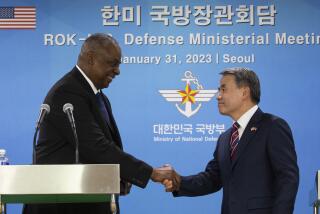White House sees long-term role for U.S. forces in Iraq
- Share via
WASHINGTON — President Bush would like to see the U.S. military provide long-term stability in Iraq as it has in South Korea, where thousands of American troops have been based for more than half a century, the White House said Wednesday.
Tony Snow, the White House press secretary, told reporters that Bush believes U.S. forces eventually will end their combat role in Iraq but will continue to be needed in the country to deter threats and to help handle potential crises, as they have done in South Korea.
The United States has 30,000 troops in South Korea; its military presence there dates to the 1950-53 Korean War.
“At some point you want to get to a situation in which the Iraqis have the capability to go ahead and handle the fundamental matters of security,” Snow said.
The U.S. would have a support role and thus be able to react quickly to major challenges or crises, even though “the Iraqis are conducting the lion’s share of the business,” he said.
Bush has mentioned the “Korean model” to help make the point that “the situation in Iraq and, indeed, the larger war on terror are things that are going to take a long time,” Snow said.
The White House comments come at a time when Congress has been pressing for a troop drawdown, and the administration has been giving mixed signals on its thinking about reducing troop levels.
Bush and officials in his administration are considering what to do after the U.S. military buildup in Iraq announced in January is completed next month, and have raised the possibility of reducing troop levels. But after those suggestions alarmed conservatives, who fear that talk of withdrawal encourages the enemy, U.S. officials emphasized Bush’s commitment to Iraq.
Michael O’Hanlon, a defense analyst at Brookings Institution, said Snow’s comparison of Iraq and South Korea would hurt efforts to convince Iraqis and others that the United States does not plan an indefinite military stay.
“In trying to convey resolve, he conveys the presumption that we’re going to be there for a long time,” O’Hanlon said. “It’s unhelpful to handling the politics of our presence in Iraq.”
Defense Secretary Robert M. Gates also has said that a long-term U.S. military presence would help stabilize the region and provide for U.S. national security.
“It’s important to defend this country on the extremists’ 10-yard line and not our 10-yard line,” Gates said this month.
*
Times staff writer Julian E. Barnes in Washington contributed to this report.
More to Read
Get the L.A. Times Politics newsletter
Deeply reported insights into legislation, politics and policy from Sacramento, Washington and beyond. In your inbox twice per week.
You may occasionally receive promotional content from the Los Angeles Times.











